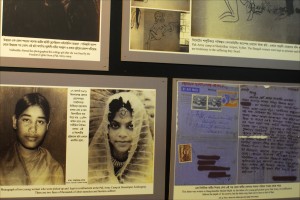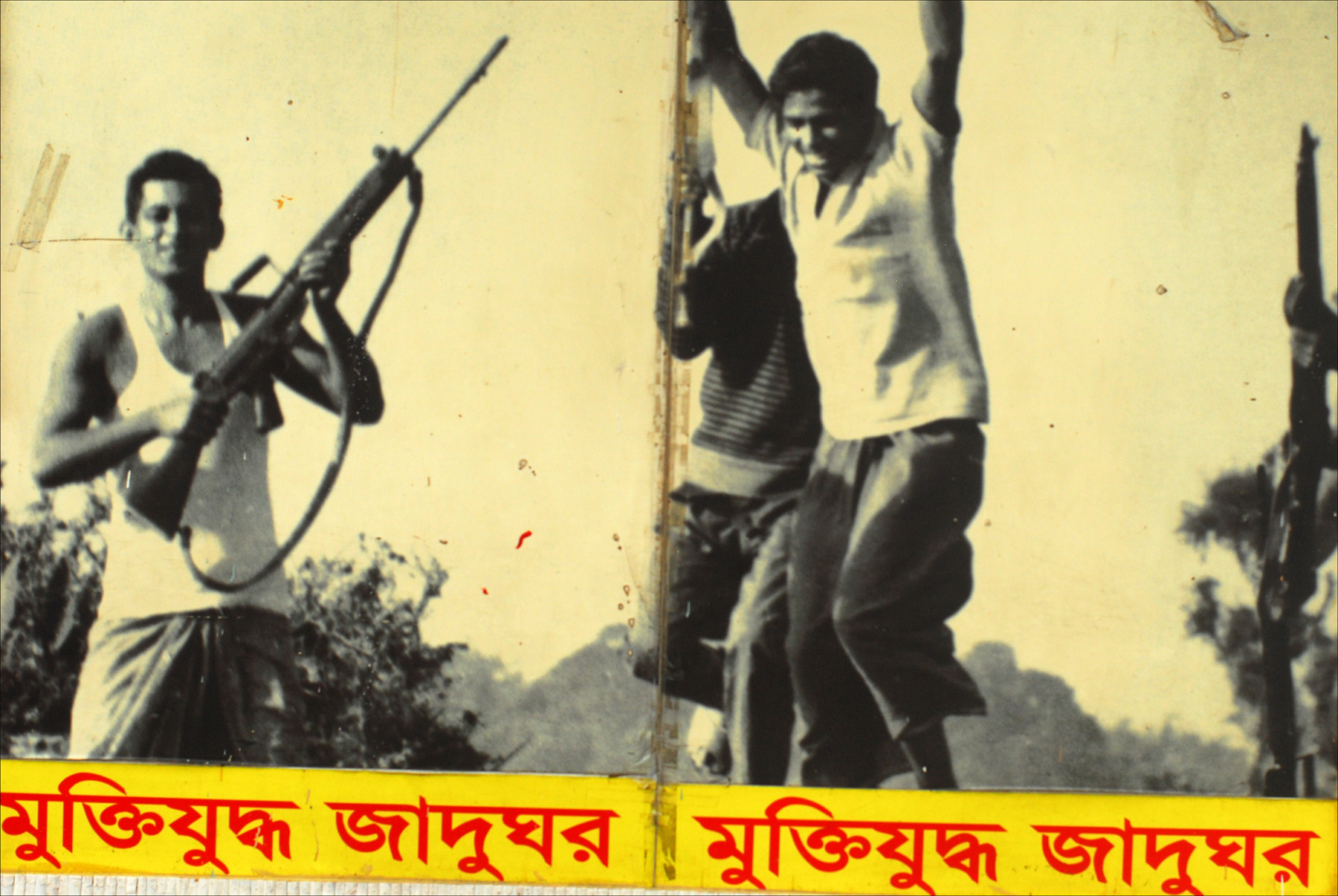George Harrison taught the world about Bangladesh
(This is the second of a two-part series on George Harrison and the Concert For Bangladesh. All photos by Larry Luxner. Feature photo: Bangladeshi freedom fighters dance with joy as they defeat Pakistan in the 1971 war for independence, as seen in this historic photograph on display at the Liberation War Museum in Dhaka.)
George Harrison’s four-minute hit single, “Bangla Desh,” released a few days before the concert itself, “is more than a song,” the country’s English-language Daily Star recently editorialized. “It is testimony to a great soul empathizing with a nation fighting for independence.”
The song’s opening lyrics tell the whole story:
“My friend came to me
With sadness in his eyes
He told me that he wanted help
Before his country dies
Although I couldn’t feel the pain
I knew I had to try
Now I’m asking all of you
To help us save some lives.”
Ziauddin Tariq Ali, 68, is a trustee of the Liberation War Museum. Interviewed in Dhaka, he said “the concert raised the consciousness of young people in the United States about Bangladesh. Before that, they were not aware what was going on here.”
Even people in Bangladesh didn’t know that George Harrison had organized a fundraiser on their behalf. They were too busy trying to survive the aftermath of 1970’s Cyclone Bhola, which had killed anywhere from 300,000 to 500,000 people, as well as wartime atrocities committed by Pakistan, whose military regime was determined not to let the country’s repressed eastern part secede to form a new nation.
“At that time, the Pakistani newspapers didn’t report on the concert, but nobody believed what the Pakistani media were saying anyway about our country,” Ali said. “They claimed that everything in East Pakistan was fine, that there was no war.”
Granted, Harrison wasn’t the only big-name personality to bring the plight of Bangladesh to the forefront of the nation’s agenda. Joan Baez’s 1971 “Song of Bangladesh” speaks hauntingly of it:
“Students at the university
Asleep at night quite peacefully
The soldiers came and shot them in their beds
And terror took the dorm awakening shrieks of dread
And silent frozen forms and pillows drenched in red.”
In November 1971, Beatnik poet Allen Ginsburg visited squalid, overcrowded camps in India housing millions of Bangladeshi war refugees. The resulting poem, “September on Jessore Road” was a damning critique of official U.S. indifference to their suffering.
The late Sen. Edward Kennedy also earned the eternal affections of Bangladeshis by visiting those camps. Upon his return to Washington, he blasted the Nixon administration — which supported anti-Soviet Pakistan — for ignoring “the brutal and systematic repression of East Bengal by the Pakistani army” and for turning a blind eye to “one of the most appalling tides of human misery in modern times.”
Writes Amazon.com reviewer Sam Graham: “1971 was a bleak period in rock history; the Beatles had broken up, Hendrix, Joplin and Morrison were dead, Woodstock was a distant memory. The Concert for Bangladesh shone like a beacon, a revelation of the better angels that reside within us all. And it still does.”

Shankar, now 92 and still touring, said the concert — which ended with the very song he inspired — exceeded everyone’s wildest expectations.
“Overnight, everybody knew the name of Bangladesh, all over the world,” he recalled later in life. “What happened is now history; it was one of the most moving and intense musical experiences of the century.”
Mohamed Mijarul Quayes, the country’s foreign secretary, was an 11-year-old boy living in Islamabad, Pakistan’s capital, when the famous Beatle and his friends made music together that August evening in New York.
“More than money, it gave Bangladesh visibility. George Harrison had a huge global following, and Ravi Shankar is an icon in our part of the world,” he told us. “In those days, you did not have CNN. It was BBC Radio that informed people, and All-India Radio. And that concert really touched peoples’ emotions.”
Dulal Chandra Biswas is director-general of the Press Institute of Bangladesh. Only seven years old at the time, he says even small children today are taught in schools about the concert and its implications.
“At the time, Bangladesh was helpless and the country was fighting a war against Pakistan,” he said. “This concert actually helped raise awareness internationally. George Harrison represented the consciousness of the great American people.”
In the past 12 months, interest in the concert has been revived thanks to Martin Scorcese’s 2011 documentary, “George Harrison: Living in the Material World.” Coincidentally, on Oct. 25, Rhino released a DVD of the concert, the same day Capitol issued a remixed, remastered CD of the project. All artists’ royalties from the sales of the DVD will go to the George Harrison Fund for UNICEF — which is raising money to fight malnutrition in Africa.
One more piece of good news for Harrison fans: Bangladesh’s Liberation War Museum will soon move from its cramped quarters to a spacious new home, following a $9 million fundraising effort. The new ultramodern facility, located in the Dhaka district of Agargaon, is expected to be inaugurated in late 2014.
“The new museum will be 20 times the size of the current one,” said Ali, adding that artifacts and documents never before shown to the public will finally be put on display. “We want to give George Harrison the proper space he deserves.”
And another Beatles’ story here.

Larry Luxner is a freelance writer with The Washington Diplomat and former editor of CubaNews. Born and raised in Miami and now based in Israel, Larry has reported from every country in the Western Hemisphere. His specialty is Latin America and the Middle East, and he’s written more than 2,000 articles for publications ranging from National Journal to Saudi Aramco World. Larry also runs an Internet-based stock photo agency at www.luxner.com.

